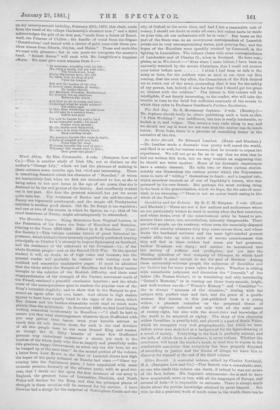The Hamilton Papers. Being Selections from Original Letters, in the
Possession of his Grace the Duke of Hamilton and Brandon, relating to the Years 1638.1650. Edited by S. R. Gardiner. (Cam- den Society.)—This volume contains letters of great historical im- portance, which hitherto have been only imperfectly published, bearing principally on Charles I.'s attempt to impose Episcopacy on Scotland, and the resistance of the adherents to the Covenant—i.e., of the whole Scottish people—and on the Second Civil War. To the special student it will, no doubt, be of high value and interest ; but the general reader will probably be content with turning over its crabbed and somewhat unattractive pages. It must be admitted that the views which the Marquis of Hamilton and his Royal master brought to the solution of the Scottish difficulty, and their total 'misapprehension of the strength of the Puritan movement north of the Tweed, rendered a peaceful conclusion hopeless ; and the whole tenor of the correspondence goes to confirm the popular view of the King's incurable duplicity, and to show that in the Marquis ho pos- sessed an agent after his own heart. And others in high station appear to have been equally blind to the signs of the times, which Ben Jenson and his brother-dramatists could road so much more plainly than the politicians. In December, 1638, we find Lord Goring writing somewhat incoherently to Hamilton :—" I shall be bold to assure you that what encouragement whatever those ill-affected with you may gather from hence, trust your humble servant so much that all will deceive them, for such is the real devotion of all this people here to our most blessed King and master, as though the ill, filthy breaths of some few ill-affected persons may underhand endeavour a storm, yet such is the wisdom of the whole body who live so happily and plentifully under this gracious, happy Government, as when any ten stir hero, let me be hanged up at the next tree." In the second portion of tho volume, a letter from Lord Byron to the Earl of Lanerick shows how high the hopes of the party defeated at Naseby had risen :—" Since my coming into the Parliament parts, 1 have negotiated with some eminent persons, formerly of the adverse party, with so good suc- cess, that I doubt not but upon the first entrance of our army in England, the greatest force of Lancashire, Cheshire, and North Wales will declare for the King, and that the principal places of strength in these counties will be secured for his service. I have likewise laid a design for the sarprisal of Nottingham Castle and the city of Oxford at the same time, and had I but a reasonable sum of money, I should not doubt to make all sure; but unless haste be made on your side, all our endeavours will be in vain." But haste on the part of the Soots was, as an anonymous correspondent of Lanerick points out in very uncompromising terms, past praying for ; and the hopes of the Royalists wore speedily crushed by Cromwell, in the fighting in Lancashire. Tho volume closes with some correspondence of Lauderdale and of Charles IL, when in Scotland. He hero core. plains, as in Woodstock :—" Ever since I came hither, I have been so narrowly watched by the severe Christians, that I could not answer
your letter before now I think I had been as safe in the army as here, for the soldiers were so kind to me upon my first coming, that the next day after, the Commission of the Kirk desired me to retire out of the army, pretending that it was for the safety of my person, but, indeed, it was for fear that I should get too great an interest with the soldiers." The letters in this volume will be intelligible, if not deeply interesting, to the reader, who will take the trouble to tarn to the brief but sufficient summary of the events to which they refer in Professor Gardiner's Puritan Revolution.






































 Previous page
Previous page